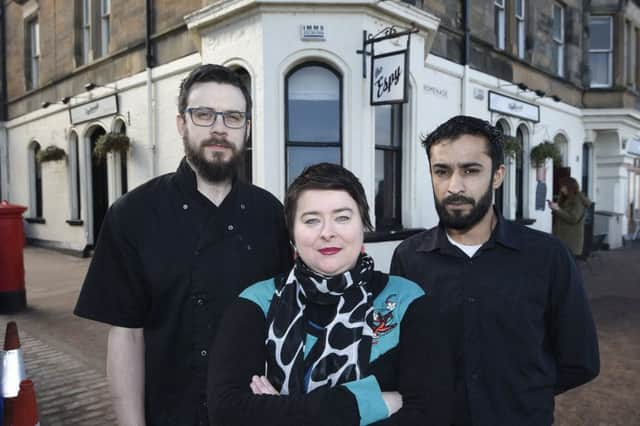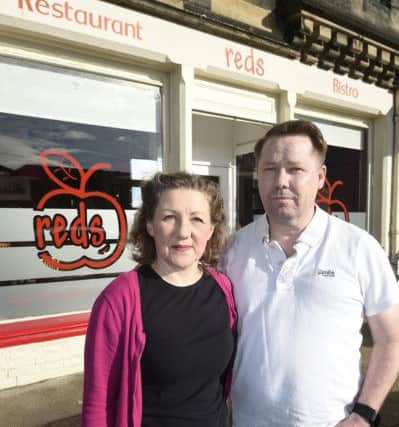Jobs at risk as businesses face closure due to rates increase


A business rates revaluation – the first since 2010 – has sparked nationwide protests as firms face massive increases in demands.
In Edinburgh, Amanda Caygill, who owns the Espy bar and restaurant on Portobello promenade, has seen her rateable value – the basis for calculation of the bills – jump by 436 per cent from £15,300 to £82,000.
Advertisement
Hide AdAdvertisement
Hide AdThat means instead of the £7350 she had to pay this year she will have to find £40,344 next year.


She said: “I cannot fathom how they work it out – there doesn’t seem to be any rhyme or reason to it. We are appealing, but you still have to pay up until the appeal is dealt with.
“So no matter what, it means a loss of jobs and prices will have to go up.
“Staff are like family to me. I’ve sat down with them and tried to work out what we can do, how far we can put prices up. No-one is going to pay £9 for a pint of Tennent’s.
Advertisement
Hide AdAdvertisement
Hide Ad“When there is dead time we will have to close, but there will still have to be job losses. Unfortunately we will probably have to change the menu too to make that works better for us.”


At Reds cafe and restaurant in Portobello High Street, Derek Wallace is angry about the revaluation of his premises, where the independent assessors have doubled the rateable value from £10,800 to £21,500. And because of the relief he has enjoyed this year but will no longer qualify for, his bill will quadruple from £2600 to £10,400.
“I nearly fell off my chair,” he said. “Our prices would have to increase by 15-20 per cent – but there are other food outlets nearby and people are very cost-conscious, so we would be killing our own business. It would spell the end for our own company – we would all be redundant and we would lose our home.”
Mr Wallace points out many other businesses nearby are in a similar position, though the local Greggs will see its rateable value increase only from £17,100 to £21,400. “That’s the busiest place on the High Street,” he said.
Advertisement
Hide AdAdvertisement
Hide AdNurseries are also affected by the revaluation, which takes effect from April 1. Edinburgh Southern Labour MSP Daniel Johnson said the average rateable value for nurseries in the Capital was going up 65 per cent from £22,645 to £37,374.
He said: “Once you take into account changes to the small business bonus and large business supplement, 71 of Edinburgh’s 112 nurseries will see their rates bill increase by an average of 81 per cent. That’s over £750,000 that will be passed on to parents in higher childcare costs.”
Business or “non-domestic” rates apply to hospitals too. The Sick Kids will be expected to pay £313,895 in business rates next year compared with the current bill of £255,000. But the demands for Edinburgh Royal Infirmary and St John’s, Livingston, will dip.
Last week there were warnings that ticket prices at tourist attractions could rise as a result of the rates increases.
Advertisement
Hide AdAdvertisement
Hide AdEdinburgh Castle’s rateable value will go up from £326,000 to £1.795 million and Edinburgh Zoo’s from £510,000 to £1.29m.
Lothian Tory MSP Miles Briggs said: “If these proposals go ahead, there will be real worries that ticket prices will have to rise and that there could be an impact on jobs at both these iconic sites. The fact these two attractions that generate so much income for the city are going to be hammered by higher rates bills is another example of the crisis facing so many businesses across Lothian as a result of the revaluation.
“The Scottish Government’s handling of this matter and response to the justified concerns of local businesses has been pathetic. Ministers have the power to help small businesses and they should be intervening and taking action.”
Liz Cameron, chief executive of Scottish Chambers of Commerce, said: “Whilst any revaluation will produce winners and losers, it is the scale of the increase facing a large number of businesses, and the lack of logical reasoning behind it, that frustrates and angers businesses.”
Advertisement
Hide AdAdvertisement
Hide AdIn his recent budget Finance Secretary Derek Mackay cut the standard business rate poundage from 48.4p to 46.6p with a higher rate of 49.2p for properties with a rateable value over £51,000. But the reduction makes little difference when rateable values are increasing so steeply.
And there are warnings some businesses could refuse to pay. Paul Waterson, chief executive of the Scottish Licensed Trade Association, said: “There are people who are going to lose their business because they can’t afford to pay it.
“There are a lot of people who say they are not going to pay because they can’t.”
Companies have called on Mr Mackay to introduce a transitional relief fund. But the Scottish Government has so far refused and said local authorities have the power to offer their own relief schemes if they choose.
Advertisement
Hide AdAdvertisement
Hide AdCash-strapped councils view that as an attempt to shift responsibility for the problem on to them at a time when their funding is being cut.
Edinburgh’s finance convener Alasdair Rankin said: “The budget we set last week for 2017-18 made no further provision for relief of business rates.”
A Scottish Government spokesman said: “Rating valuation of business properties is undertaken by independent assessors.
“Each council retains all the business rates revenue it collects, and it is for councils to apply rates reductions, on top of existing statutory reliefs, as they see fit.”
Where does the money from business rates go?
Advertisement
Hide AdAdvertisement
Hide AdBUSINESS rates from across Scotland used to be pooled and redistributed to councils according to a formula. Edinburgh lost more than £1 billion over a decade.
Now councils keep the business rates they collect – but central government funding is adjusted accordingly.
Figures show if Edinburgh’s cash from the Scottish Government had been frozen at 2011 levels and the city was allowed to benefit fully from increased business rates income, the council would have an extra £78 million this year.
Council leader Andrew Burns said: “The amount collected in business rates in Edinburgh has gone up very significantly over the last ten years because of the buoyancy of the local economy. You would think that would mean Edinburgh was doing well – but at the same time the Scottish Government has quietly reduced our revenue grant and the overall money we get has been broadly static for a decade or so.
Advertisement
Hide AdAdvertisement
Hide Ad“The economy is doing well, but there is no direct benefit to the council.”
Comment: Andy Wightman
NON-DOMESTIC rates generate almost £3 billion a year for council services and are the second highest-yielding tax set by Scottish ministers after income tax, yet there is almost no public scrutiny.
Local councils are being denied control over what should be part of their economic tool kit.
It’s time to shed light on how and where business rates are decided.
Advertisement
Hide AdAdvertisement
Hide AdIn particular, it is bizarre to note that the only justification for the 1.8p cut next year in the non-domestic rate is to bring it into line with England.
What is the point of having control over taxation if ministers just copy Tory policy in Westminster?
In 1988, the Conservative government removed non-domestic rate setting from councils and centralised it in the hands of ministers. This continued under devolution and means that non-domestic tax rates are set by Scottish ministers with no vote – unless an MSP forces one.
In 17 years of devolution the rate has never been voted on by the full chamber and it has been ten years since it was voted on by a committee.
Advertisement
Hide AdAdvertisement
Hide AdIt’s vital that we have greater scrutiny over non-domestic rates and ensure they are set in a fair way that meets local needs.
The Scottish Greens believe that rather than being set centrally by government ministers and distributed to councils, local authorities should set half of the rate, so they can respond to local circumstances such as changes in property values.”
Andy Wightman is a Green MSP for Lothian and party spokesman on local government.